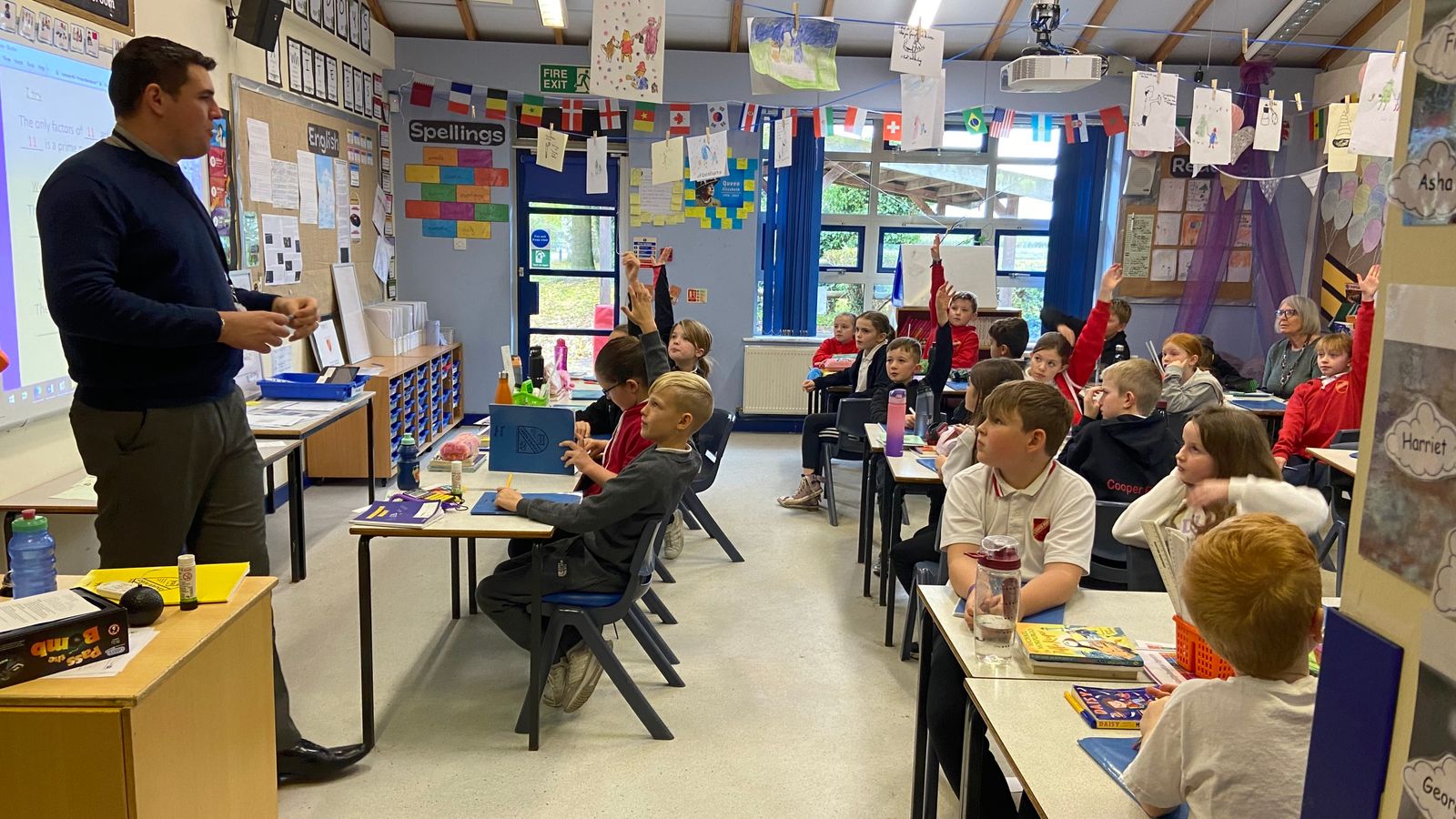A headteacher has told Sky News she feels “sick” and “very, very worried about the future” as she revealed she will have to make several staff redundant as spiralling costs have left her school facing a massive deficit.
Teaching unions are warning that unless school budgets are increased it will be “catastrophic” for children as a survey has found the majority of schools face making redundancies next year.
Half of schools are looking at cutting teachers or teaching hours, and two thirds say they’ll have to reduce the number of teaching assistants, according to a survey of more than 11,000 schools carried out by school leader’s union the NAHT.
Headteachers around the country have told Sky News they face the choice of cutting staff or going into the red as they struggle to pay for rising food and energy bills and a wage increase for teaching staff that has to come out of existing school budgets.
‘Huge cuts to staffing’
Speaking anonymously, one headteacher said she has decided to not tell staff about redundancies until after Christmas.
“We are going to have to make huge cuts to staffing,” she said.
Cost of living: Air fryer sales rocket by 3,000% as consumers seek to slash energy costs
Business Secretary Grant Shapps hints at autumn budget windfall tax expansion on energy firms due to ‘unexpected profits’
National Insurance rise will be reversed from today – as millions of workers to keep an extra £330 of their money a year on average
“The amount of money we need to save equates to probably three senior teaching staff. We will also need to cut some support staff. We’ll have to look at cutting staffing for any extra-curricular activities.
“At the moment we pay for speech and language support… we will have to cut that and that is really needed by our younger children.”
Explaining her decision to wait to tell the people affected, she said: “Staff know that there are huge financial difficulties but we haven’t, in so many words, said that we are going to have to make redundancies and I’m not going to do that until after Christmas.
“They’ve worked so hard all through the pandemic, all the time, and because we haven’t had funding for so long the staff have given up their time for free on numerous occasions and I just want them to enjoy their holiday without having the threat of redundancy hanging over them.
“I didn’t come into teaching to give a less than good education. Once these cuts have been made, the standard of education in my school will not be good.
“I feel sick and I feel horrified for the families in the community that we serve. I feel very, very worried about the future.”
‘It’s heartbreaking’
Her concern is echoed by Emily Proffitt, the headteacher of Cooper Perry Primary School in Staffordshire.
“We’re in crisis, every school is in crisis, cost of living is going up, cost of wages is going up, energy prices, transport, you name it, it’s going up,” she said.
Over the last 18 months, three teaching assistants have left her school for better paid work. She hasn’t been able to afford to replace them and says she can’t cut staff numbers any further.
Read more:
School-age children struggling with talking and understanding words following pandemic, survey finds
Girls routinely get better grades than boys in class – and researchers think they know why
Schools that ban afros, braids, cornrows and plaits might be breaking the law, watchdog warns
Instead, she relies on donations from parents for new equipment. And she’s increased some class sizes to 32 children.
“For every child we get, we get additional money into the budget,” she explains.
“Morally, it’s not great. We want to do as much as we can to support children in their education. That’s less one-to-one time for each child and increased workload for my staff.
“The vulnerable children are the most affected,” she added. “It’s heartbreaking.”
Even when schools aren’t making redundancies, they’re struggling to retain staff on the wages they’re able to pay them.
‘I love my job. I’m mortified I’m having to move on for financial reasons’
Emma Smith has been a teaching assistant for ten years. But with two teenage boys to support she says she simply can’t afford to live on the £12,000-a-year salary.
“I could go and work in a supermarket stacking shelves for around that which obviously has got no responsibility,” she told Sky News.
She’s taken the decision to retrain as a driving instructor but it wasn’t a choice she wanted to have to make.
“I absolutely love my job and I’m mortified that I’m having to move on for financial reasons,” she said.
“I honestly thought when I started here that I’d be here until I retired.”
Union leaders are urging the government to listen to their concerns ahead of an autumn budget expected to include large cuts to public spending.
‘Most vulnerable will be hit hardest’
Paul Whiteman, general secretary of the NAHT, told Sky News: “Failure to increase budgets would be catastrophic for young people.
“We can see the attainment gap widening for those that are most vulnerable to those other children right now as well. And it would be a disaster for the country, at the same time, too, we need to invest in this country’s future, which means investing in young people.”
His warning is echoed by Julie McCulloch, the director of policy at the Association of School and College Leaders.
“What we know is that those schools that have the highest number of children with special educational needs or other additional needs are going to bear the brunt mostly here and that’s because they just won’t be able to employ as many teaching assistants and support assistants,” she said.
“So what’s really worrying here is that our most vulnerable children and young people as ever are likely to be hit hardest.”
A spokesperson for the Department for Education said: “We understand that schools are facing cost pressures which is why we are providing them with £53.8bn this year in core funding, including a cash increase of £4bn for this financial year. This is a 7% per pupil increase in cash terms across schools and high needs.
“All schools will benefit from the Energy Bill Relief Scheme, reducing how much they need to spend on their energy and giving them greater certainty over their budgets over the winter months. We are also providing schools with tools and information to help get the best value for money from their resources.”








